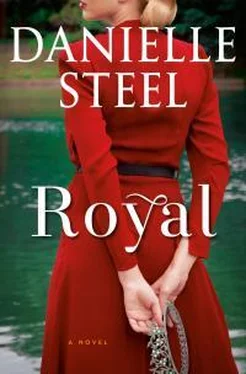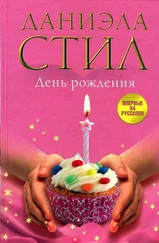Royal is a work of fiction. Names, characters, places, and incidents are the products of the author’s imagination or are used fictitiously. Any resemblance to actual events, locales, or persons, living or dead, is entirely coincidental.
Copyright © 2020 by Danielle Steel
All rights reserved.
Published in the United States by Delacorte Press, an imprint of Random House, a division of Penguin Random House LLC, New York.
DELACORTE PRESS and the HOUSE colophon are registered trademarks of Penguin Random House LLC.
Hardback ISBN 9780399179655
Ebook ISBN 9780399179662
randomhousebooks.com
Book design by Virginia Norey, adapted for ebook
Cover design: Laura Klynstra
Cover image: © Richard Jenkins
ep_prh_5.5.0_c0_r0
Contents
Cover
Title Page
Copyright
Chapter 1
Chapter 2
Chapter 3
Chapter 4
Chapter 5
Chapter 6
Chapter 7
Chapter 8
Chapter 9
Chapter 10
Chapter 11
Chapter 12
Chapter 13
Chapter 14
Chapter 15
Chapter 16
Chapter 17
Chapter 18
Dedication
By Danielle Steel
About the Author
Chapter 1
In June of 1943, the systematic bombing of England by the German Luftwaffe, targeting Britain’s cities and countryside, had been going on for three years. It had begun on September 7, 1940, with heavy bombing of London, causing massive destruction in the city, at first in the East End, then the West End, Soho, Piccadilly, and eventually every area of London. The suburbs had also been severely damaged. Buckingham Palace was bombed on September 13, six days after the daily raids began. The first bomb landed in the quadrangle, a second crashed through a glass roof, and another demolished the palace chapel. The king and queen were in residence at the time.
Other historic places were rapidly added to the flight path of the German bombers. The Houses of Parliament, Whitehall, the National Gallery, Marble Arch, various parks, shopping streets, department stores, Leicester, Sloane, and Trafalgar Squares were bombed too. By December of 1940, almost every major monument had been injured in some way, buildings had collapsed, and countless citizens had been injured, rendered homeless, or killed.
The intense bombing raids had continued for eight months, until May of 1941. Then a period called “the lull” set in with daily attacks, but with less intensity than in the earlier months. The damage and deaths had continued. For the past two years, Londoners had done their best to get used to it, spending nights in air raid shelters, helping to dig out their neighbors, volunteering as air raid wardens, and assisting with the removal of millions of tons of debris to make streets passable. Limbs and dead bodies were frequently found in the rubble.
During the first year of the bombing, eighteen other cities were bombed as well, several suburbs, and in the countryside Kent, Sussex, and Essex had suffered grievously. As the years went on, the coastlines had been heavily bombed too. Nowhere appeared to be truly safe. Prime Minister Winston Churchill and King Frederick and Queen Anne did their best to keep up morale and encourage their countrymen to stay strong. England had been brought to its knees, but had not been defeated, and refused to be. It was Hitler’s plan to invade the country once it had been severely damaged by the constant bombing raids, but the British government would not allow that to happen. By the summer of 1943, nerves were stretched, and the damage was considerable, but the English people refused to give up.
The Germans were fighting hard on the Russian front as well, which gave the English respite.
The ear-shattering sirens had sounded again that night, as they did almost every night, and the king and queen and their three daughters had taken refuge in the private air raid shelter that had been set up for them in Buckingham Palace, in what had previously been the housekeepers’ rooms, reinforced by steel girders, with steel shutters on the high windows. Gilt chairs, a Regency settee, a large mahogany table gave them a place to sit, with axes on the wall, oil lamps, electric torches, and some minor medical supplies. Next door there was a shelter for members of the royal household and staff, which even included a piano. With over a thousand staff members in the palace, they had to use other shelters as well. They waited for the all clear and had been in the shelter close to a thousand times by then. The two elder royal princesses had been sixteen and seventeen when the first air raids had started.
Families had been urged to send their children to the country for safety, but the royal princesses had stayed in London to continue their studies and do war work as soon as they turned eighteen. And when the bombing was too severe, their parents sent the royal princesses to Windsor Castle, for a break. Princess Alexandra drove a lorry now, at twenty, and was a surprisingly competent mechanic, and at nineteen, Princess Victoria was working at a hospital doing minor tasks, which freed up the nurses to tend to the severely injured. Their younger sister, Charlotte, was fourteen when the bombing began, and the king and queen had considered sending her to Windsor, or Balmoral, their castle in Scotland, but their youngest child was small, and had delicate health, and the queen had preferred to keep her at home with them. The princess had suffered from asthma since she was very young, and the queen did not wish to part with her, and preferred to keep her close. Even now, at seventeen, she wasn’t allowed to do the war work her sisters were engaged in, or even the things they had done at her age. The constant dust from fallen buildings and the rubble in the streets were hard on her lungs. Her asthma seemed to be growing steadily worse.
The day after the most recent bombing, the king and queen discussed Charlotte’s situation again. Although she was Queen Victoria’s great-great-granddaughter, a fairly distant connection, Charlotte had inherited her diminutive size from her illustrious ancestor. It was unlikely that Charlotte would ever be on the throne, since she was third in line after her two older sisters. She chafed at the restrictions her family and the royal physician put on her. She was a lively, spirited girl, and a brilliant rider, and wanted to make herself useful in the war effort, despite her size and her asthma, but her parents had continued to refuse.
The dust in the air was particularly thick the next day. The queen gave Charlotte her medicine herself, and that night, she and the king spoke yet again about what to do with their youngest daughter.
“Sending her to the countryside would encourage others to do the same,” her father said with a pained voice while the queen shook her head. Many families had sent their children away in the last four years, since war was declared, at the government’s insistence. A shocking number of children had been killed in the bombing raids, and parents had been urged to send their children to safer areas. Some concurred, other parents were afraid to let their children go, or couldn’t bear the thought of being parted from them. Travel was difficult and frowned on, with heavy gas rationing, and some parents who had sent their children away hadn’t seen them for several years since they’d left. Bringing their children home for holidays was strongly discouraged, for fear that the parents wouldn’t send them away again. But unquestionably London and the other cities were more dangerous than the rural areas where they were being housed by kind people who had opened their homes to them. Some hosts took in a number of children.
“I don’t trust Charlotte to take her medicine if we send her away. You know how she hates it, and she wants to do the same work as her sisters,” her mother said sympathetically. Charlotte’s oldest sister, Alexandra, who would inherit the throne one day, understood their mother’s concerns perfectly, and insisted to Charlotte that she respect the limitations of her health. Her sister Victoria was less compassionate. She had always felt a rivalry with her younger sister, and occasionally accused her of faking the asthma attacks in order to shirk the war work that Charlotte wanted to do desperately, and had been forbidden from doing so far. There were frequent verbal battles between the two girls. Victoria had resented Charlotte since the day she was born, and treated her like an intruder, much to her parents’ dismay.
Читать дальше












